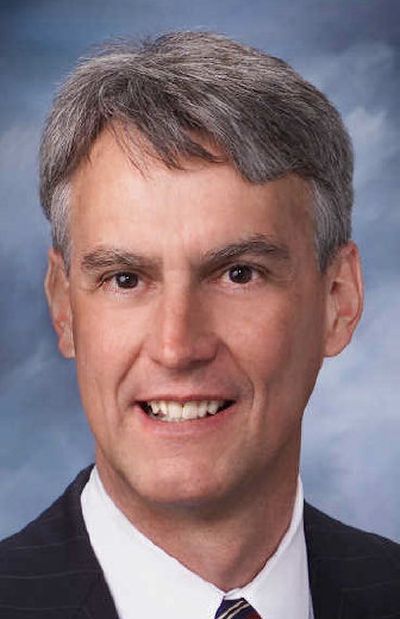EPA official to avoid some Idaho issues

BOISE – L. Michael Bogert, the new boss for the Pacific Northwest region of the Environmental Protection Agency, said he’s recusing himself from EPA decisions on some Idaho issues, including the Silver Valley mining Superfund cleanup, to avoid any appearance he’s favoring his former clients or employer.
A lawyer who helped political leaders in California and Idaho bring environmental and water cases against the federal government, Bogert is the first Idahoan in nearly 20 years to direct the more than 600 employees and $500 million annual budget in monitoring compliance with federal anti-pollution and public health safety laws in Idaho, Oregon, Washington and Alaska.
“Once I get the ethical issues straightened out, and determine what role I can have on issues impacting Idaho, the Coeur d’Alene Basin is at the top of the region’s priorities and I don’t expect that to change,” he told the Associated Press in a recent interview.
The last Idahoan to hold the job, Robie Russell, was appointed in 1986. He became mired in ethical violations over cleaning up mining contamination from the Bunker Hill smelter complex in Kellogg, one of the nation’s first Superfund sites. Russell, a Moscow native, took extraordinary measures to prevent EPA officials from enforcing Superfund cleanup rules in the Silver Valley, according to a 1990 Inspector General’s report.
That episode left many within EPA skeptical of Idaho’s commitment to clean up tons of toxic heavy metal waste in the Coeur d’Alene Basin, a plume of pollution stretching across the Idaho Panhandle from Montana to Spokane.
“A lot of people remember the Robie Russell era and they do not want to go there again,” said Eric Schaeffer, who resigned as head of the EPA’s Office of Regulatory Enforcement in 2002 and now directs the Environmental Integrity Project in Washington, D.C. “Idaho has a tradition of being industry-friendly and the thing about being an EPA administrator in that part of the world is you have to say no to some very powerful people.”
Until Bogert was sworn in by EPA Administrator Stephen Johnson on Aug. 15, he was collecting a paycheck from some of those people. Bogert was Dirk Kempthorne’s staff general counsel from 1999 to 2004 and then represented the governor in his private law practice.
“I had him as a client quite literally right up until I left my firm for this job,” Bogert said.
Bogert negotiated on behalf of the Idaho governor with federal agencies on several issues, including the Silver Valley Superfund cleanup, endangered salmon recovery on the Columbia-Snake river system, the Nez Perce Tribe’s Snake River water rights claims, grizzly bear and wolf reintroduction plans, wilderness area water rights, and agricultural field burning compliance with the Clean Air Act.
Now, the man who frequently challenged federal environmental programs in Idaho is in charge of overseeing enforcement of those same regulations in his home state.
“It’s a disaster,” said Steve Berman, a Seattle class-action attorney representing a coalition of Idaho and Washington groups seeking to declare field burning a public health hazard. “He helped the governor orchestrate passage of a bill that immunized farmers from field-burning lawsuits and acted so hand-in-glove with the farmers we wondered if he was secretly on their payroll.”
The Pacific Northwest is EPA’s largest and most sparsely populated region. It’s also divided by a chasm of cultural and political attitudes toward EPA’s role in protecting the environment and public health, said John Iani, Bogert’s predecessor as regional administrator.
“Alaska and Idaho are very similarly aligned in their thinking of federalism and that the states should run the show, but they haven’t developed their own environmental processes enough to take over,” said Iani, who was appointed to the job in 2001 after working as an executive for an Alaskan seafood company. “Then, you have Oregon and Washington which have developed their own processes and EPA is mainly in an approval role.”
Within EPA, staff reaction to Bogert’s appointment has been varied.
“We’re really impressed with the inclusive nature of the dialogue and the pretty significant humility in telling us he’s relying on our expertise,” said Mark Masarik, hazardous waste coordinator for EPA’s Idaho operations office.
“The two words that keep popping up in my conversations with EPA staff are despair and demoralized,” said TJ Johnson, director of Washington Public Employees for Environmental Responsibility, an Olympia-based watchdog group.
Bogert’s forthcoming recusal memo for his job at EPA will outline the “covered relationships” he will have to abstain from because of potential conflicts with his past clients and employers. But he said the rules of engagement will still allow him to closely follow Idaho issues before EPA.
“In talking to our ethics folks, I will be complete fair game to stay advised what’s going on,” Bogert said. “If there comes a point that will require some action, we will have to divert that when appropriate.”
John Stanton of the National Environmental Trust in Washington, D.C., says the self-policing inherent in recusal memos leaves wide leeway for federal executives to decide where the line of appropriate influence is drawn.
“The idea he’s going to be impartial when it comes to a fresh look at whether the state’s in compliance or not cuts against what’s happened in the past,” Stanton said.
Iani believes Bogert will be able to shepherd EPA issues in Idaho without straying beyond ethical boundaries, despite the tarnished legacy of his Idaho predecessor.
“It’s an unfortunate situation and I don’t know how it’s going to work out, but Michael will get through that because he’s a very careful guy,” said Iani. “When you look under the hood, this is a pretty moderate person politically. But he’ll also be very attentive to Idaho.”